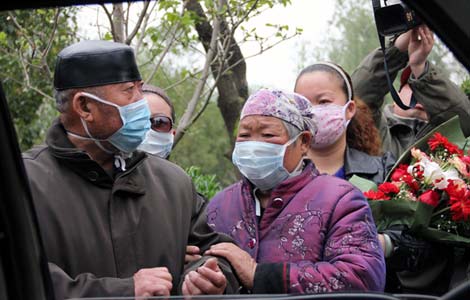Wider insurance coverage sought
Updated: 2013-04-26 00:21
By CHEN XIN (China Daily)
|
||||||||
The social security authority on Thursday urged wider coverage of work-related injury insurance to better protect the rights of workers who face a high risk of injury.
"We will strengthen efforts to push enterprises in high-risk industries, such as mining and construction, to provide work-injury insurance for workers. Those industries are our key targets in this field," Yin Chengji, spokesman for the Ministry of Human Resources and Social Security, told a news conference.
"We have been stressing employers' responsibilities in this matter," he said.
Yin did not elaborate on any concrete measure the ministry will take to extend insurance coverage.
Current laws require companies to provide work injury insurance for employees and ensure the country's work injury insurance fund covers treatment fees and compensation to injured workers — as long as the employee's company pays for the insurance.
If the employer did not pay for the insurance, it should be responsible for all fees.
Zhao Wei, a labor expert at Beijing Normal University, said farmers who became migrant workers are major victims of work-related injuries.
A survey last year conducted by Zhao found that only 33 percent of construction workers in Beijing have signed labor contracts with employers.
"Almost all workers are covered by work-injury insurance as long as they have signed employment contracts with bosses," she said. "But we found that a majority of construction workers have no insurance coverage."
Zhao said although most employers who do not provide work-injury insurance would pay for injured workers' first aid, they do not provide compensation.
"Most workers whose injuries are not that serious will go back to work after recuperating for some days, and they do not ask for compensation because they are more worried about losing a job," she said.
Workers who are badly injured at work have to go through time-consuming and complicated procedures if they want to sue the employer and get treatment fees and compensation, according to Zhao.
Workers should provide documentation, including proof of employment, before they can apply for work-related injury diagnosis.
A regulation released by the Ministry of Human Resources and Social Security in 2011 requires its nationwide grassroots bureaus to use the work-injury insurance fund to pay workers' medical expenses if their employers did not provide workers' insurance coverage and refused to take responsibility for treatment fees.
Then bureaus can order employers to pay those fees, according to the regulation.
But the regulation has been poorly implemented, according to Zhao.
Huang Leping, head of the non-governmental organization Beijing Yilian Legal Aid and Study Center of Labor, said a majority of miners in State-owned enterprises are covered by work-injury insurance, but in small and medium-sized privately run mines, the rate of coverage is low.
"Miners are vulnerable to occupational diseases such as black lung, and it always takes a long time before they can receive compensation if they did not have work injury insurance," he said.
Most Viewed
Editor's Picks

|

|

|

|

|

|
Today's Top News
Phone bookings for taxis in Beijing
Chinese consumers push US exports higher
Seoul delivers ultimatum to DPRK
Boston bombing suspects intended to attack NYC
No let up in home price rises
Bird-watchers undaunted by H7N9 virus
Onset of flood season adds to quake zone risks
Vice-president Li meets US diplomat
US Weekly

|

|














